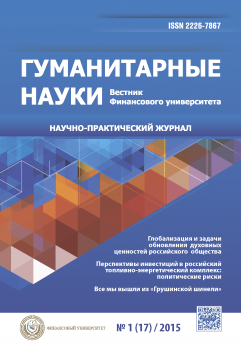The paper considers the subjective causes of the February revolution of 1917. How reasonable is the point of view, that the overthrow of the monarchy has been the result of a severe deterioration in the economic situation of the country and falling living standards? To answer this question, the author selects for comparison realities of Soviet Russia and the USSR, showing that the main charges brought against the «old order» can be brought against the Soviet regime either. Moreover, the scale of problems faced by the USSR, significantly surpasses those faced by the tsarist Russia. However, in the days of the Soviet Union, neither the Lenin’s nor the Stalin’s regimes had been thrown down. This fact casts doubt on the correctness of the ideas, that the 1917 Revolution can be explained by objective reasons, including the so-called worker and peasant issues, and military defeats Russia was suffering in the First world war, and the poor supply of food to the capital. The author analyzes the actions of some members of the power elite of the state during the February crisis, and concludes that disruptions in the bread supply of Petrograd have been caused by some subjective reasons and are the sabotage acts on part of those who had prepared the revolution. Thus the author shares the elitist sociological concept, according to which it is the elite, rather than the masses, is the main subject of historical development. Current world events related to the chain of the so-called «color revolutions» gives the article the urgency, as the technology of the overthrow of the monarchy in Russia is similar to the methods that were used during the «color revolutions» nowadays.
the February Revolution, monarchy, World War I, tsar Nicholas.
1. Peregudova Z.I. Okhranka. Vospominaniya rukovoditeley politicheskogo syska [The Secret Service. Memories of the leaders of political investigation]. V.1. Moscow, New Literary Review Publ., 2004. 512 p.
2. Kurlov P.G. Gibel’ imperatorskoy Rossii [Death of Imperial Russia]. Moscow, Zakharov Publ., 2002. 301 p.
3. Zavarzin P.P. Zhandarmy i revolyutsionery [The police and the revolutionaries]. Paris, The publication of the author Publ., 1930. 256 p.
4. Os’kin M.V. Prodovol’stvennaya politika Rossii nakanune Fevralya 1917 goda: poisk vykhoda iz krizisa [Food policy of Russia on the eve of February 1917: fi nding a way out of the crisis]. Rossiyskaya istoriya [Russian history]. 2011, I. 3. Р. 53-66.
5. Globachev K.I. Pravda o russkoy revolyutsii: Vospominaniya byvshego nachal’nika Petrogradskogo okhrannogo otdeleniya [The truth about the Russian Revolution: Memoirs of the former chief of the Petrograd Okhrana]. Moscow, ROSSPEN Publ., 2009. 519 p.
6. Chernyaev Yu.V. Gibel’ tsarskogo Petrograda: Fevral’skaya revolyutsiya glazami gradonachal’nika A.P. Balka [The death of the king’s Petrograd: February Revolution through the eyes of the mayor A.P. Balka]. Russkoe proshloe [Russian past]. Leningrad, Svelen Publ., 1991. P. 7-19.
7. Katkov G.M. Fevral’skaya revolyutsiya [The February revolution]. Moscow, Tsentrpoligraf, 2006. 478 p.





